Premenstrual Syndrome (PMS) Medication

Premenstrual syndrome is one of the common conditions that affect women’s physical, emotional, and behavioral health during their menstrual cycle. The condition shows its signs and symptoms just before the period begins. PMS can have a negative effect on women’s quality of life.
Indications of premenstrual syndrome vary from mild to severe PMS. Most females experience mental and physical signs that their periods are due. While some women experience severe manifestations, PMS isn’t that troublesome for others. PMS is not age-restricted and women can experience its signs at any time between the onset of puberty and menopause. In fact, over 90 percent of women suffer from premenstrual dysphoric disorder, PMDD, during their menstruation cycle.
PMDD is a condition that accompanies PMS and causes severe depression, stress, and irritability in women. Premenstrual syndrome, along with PMDD indications, can impair functioning in various aspects of life.
This is where the role of women’s premenstrual syndrome medication comes into play. If the condition impacts your quality of life, it is essential to seek medical assistance or medicament that can help relieve PMS. Let’s delve into the details to find more about specific forms of PMS and how compounding medications can improve your health.
PMS – A General Overview
PMS symptoms generally begin 5 to 11 days before your menstrual cycle begins and subside when menstruation begins. The primary causes of this disorder are unknown but many medical experts believe that it correlates with a change in the level of serotonin, or sex hormones.
Remember that with age women’s bodies go through many changes that affect their premenstrual cycle. There is a fluctuation in hormone levels that leads to issues like low libido, weight gain, sleep deprivation, and urinary problems.
Thanks to custom compounding solutions that help manage female’s health needs using compound medicament. It is not only effective for Pre-Menstrual disorder but also an excellent way to tailor specific health needs.
With compound medication, females can reduce menstrual headaches and vaginal dryness that happens due to decreased estrogen levels. It balances deficiencies and makes a safe and natural alternative to harmful synthetic medication.
Compounding pharmacy also addresses mood changes, anti-aging and weight management to help females perform daily activities without opting for other treatment options.
Symptoms
The indications of PMS include:
- abdominal bloating
- acne
- food cravings
- diarrhea
- constipation
- headaches
- appetite changes
- sensitivity to sound
- irritability
- breast tenderness
- fatigue
- Poor sleep patterns
- depression and anxiety
- emotional outbursts

When to See the Doctor about PMS symptoms?
If you experience the symptoms almost every month before menstrual cycles, it might be premenstrual syndrome (PMS).
While some women benefit from herbal remedies and home-based treatment for PMS, medical advice, diagnosis, or treatment is critical for others. Lifestyle changes may also help reduce PMS symptoms.
PMS Medication
Depending on your condition’s severity, your health care provider will prescribe medications for PMS. Some commonly prescribed medicines for premenstrual disorder are:
Antidepressants
Serotonin reuptake inhibitors SSRIs are antidepressants that include sertraline (Zoloft), fluoxetine (Prozac, Sarafem), and paroxetine (Paxil, Pexeva).
SSRIs can reduce mood swings and are a reliable option for PMDD and PMS. Patients need to take the medication daily to improve daily life and escape social withdrawal.
(NSAIDs)
NSAIDs are another treatment option that doctors may prescribe to take before the menstrual period. NSAIDs, including ibuprofen or naproxen sodium ease mood, breast discomfort, and cramping during or before the period.
Diuretics
When limiting your salt intake and exercise are not enough to reduce bloating and swelling, taking diuretics (water pills) can help in fluid retention through kidneys. Spironolactone is a diuretic to ease symptoms.
Hormonal Contraceptives
The prescription medications are effective to stop ovulation, thereby giving relief.
What Else?
Apart from seeking medical advice or diagnosis from obstetricians and gynecologists, you can try other ways to get rid of premenstrual syndrome symptoms.
- Exercise can help you reduce stress
- Reduce the number of sugary drinks and carbohydrates you take before the menstrual period to help the symptoms.
- Reduce intake of caffeine and alcohol as they can make the symptoms worse.
- Take birth control pills to relieve the signs that mimic PMS or PMDD
Conclusion
Premenstrual syndrome is a common problem women experience before their period starts according to the American college of obstetricians. If your symptoms persist, see your doctor to improve your overall health. Compounding medication from Fort Worth Pharmacy can be an effective way to treat the symptoms of this syndrome.
Get in touch with our compounding pharmacy to explore solutions about women’s health and solution to your PMS symptoms.
https://www.webmd.com/women/pms/medicine-for-pms
